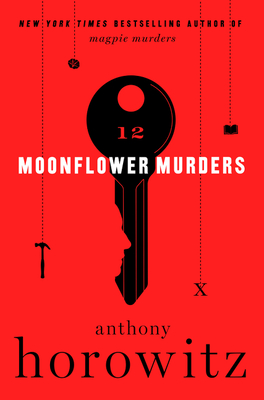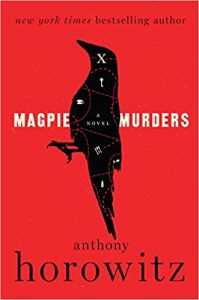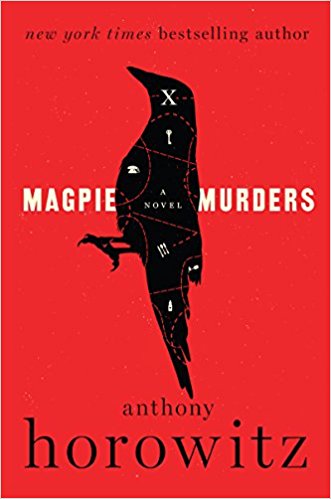 Moonflower Murders (Susan Ryeland #2) by Anthony Horowitz
Moonflower Murders (Susan Ryeland #2) by Anthony Horowitz Format: audiobook, eARC
Source: purchased from Audible, supplied by publisher via Edelweiss
Formats available: hardcover, paperback, ebook, audiobook
Genres: mystery, thriller
Series: Susan Ryeland #2
Pages: 608
Published by Harper on November 10, 2020
Purchasing Info: Author's Website, Publisher's Website, Amazon, Barnes & Noble, Kobo, Bookshop.org
Goodreads
Featuring his famous literary detective Atticus Pund and Susan Ryeland, hero of the worldwide bestseller Magpie Murders, a brilliantly complex literary thriller with echoes of Agatha Christie from New York Times bestselling author Anthony Horowitz.
Retired publisher Susan Ryeland is living the good life. She is running a small hotel on a Greek island with her long-term boyfriend Andreas. It should be everything she's always wanted. But is it? She's exhausted with the responsibilities of making everything work on an island where nothing ever does, and truth be told she's beginning to miss London.
And then the Trehearnes come to stay. The strange and mysterious story they tell, about an unfortunate murder that took place on the same day and in the same hotel in which their daughter was married—a picturesque inn on the Suffolk coast named Farlingaye Halle—fascinates Susan and piques her editor’s instincts.
One of her former writers, the late Alan Conway, author of the fictional Magpie Murders, knew the murder victim—an advertising executive named Frank Parris—and once visited Farlingaye Hall. Conway based the third book in his detective series, Atticus Pund Takes the Cake, on that very crime.
The Trehearne’s, daughter, Cecily, read Conway’s mystery and believed the book proves that the man convicted of Parris’s murder—a Romanian immigrant who was the hotel’s handyman—is innocent. When the Trehearnes reveal that Cecily is now missing, Susan knows that she must return to England and find out what really happened.
Brilliantly clever, relentlessly suspenseful, full of twists that will keep readers guessing with each revelation and clue, Moonflower Murders is a deviously dark take on vintage English crime fiction from one of its greatest masterminds, Anthony Horowitz.
My Review:
For a dead man Alan Conway certainly does manage to get around. He even manages to cause just as much mischief from the grave as he did while alive. Something that he is probably looking down upon, or more likely up towards from below, with a great deal of pride if not utter glee.
In life, Alan Conway was not what one would call a “good person”, even if he was a very good author of very twisty mysteries. Until he became part of one himself, in the story that is told in the first book of the Susan Ryeland series, Magpie Murders.
As a reader, I wasn’t expecting to see Ryeland, Conway, or the detective character that Conway created, Atticus Pünd, ever again. After all, as Charles Dickens so eloquently opened A Christmas Carol, “Marley was dead to begin with” just as Alan Conway is at the start of Moonflower Murders. Atticus Pünd was a product of Conway’s now dead imagination, and Susan Ryeland is not just out of a job at the end of Magpie Murders, but the publishing company she worked for is as dead as Conway.
I have to say that of the three of them, I missed Atticus Pünd the most. In my review of Magpie Murders I said that I really wished the Pünd series actually existed because I would love to read them. Based on Moonflower Murders, it is entirely possible that I might get my wish.
There is a complete Atticus Pünd mystery enclosed within the pages of Moonflower Murders. However, unlike Magpie Murders, the title of both the book by Anthony Horowitz is different from the Atticus Pünd book by Alan Conway that forms the heart of the case that Susan Ryeland finds herself stuck in the middle of, whether that’s where she wants to be, or not.
In this case it’s more like wants to be. Or at least wants to be if there has to be a case at all. Which there definitely does. And it’s all, just as it was in Magpie Murders, Alan Conway’s fault.
As this story opens, it’s been two years since the events of Magpie Murders brought Susan Ryeland’s career in publishing to an end, and brought Alan Conway to his. His end, that is. (His books seem to be doing just fine.) Susan is now the co-owner of a small hotel in Crete, with her business-and-domestic partner Andreas. At the point where the Trehernes, Conway and this case invade her life, the hotel is losing money, Susan has lost her patience with being a hotel owner and her relationship with Andreas has lost much of its steam.
So she’s ready for a change, or at least a break. The Trehernes in their tragedy offer her both a partial solution to the hotel’s problems and a break from her own. They are willing to pay her 10,000 pounds to come back to England and stay at their hotel for a week. (That’s nearly $14,000 (US) so enough to make a serious dent in the inn’s financial problems. A real temptation on that front alone, without Susan’s other reasons for taking a break from Crete, innkeeping and Andreas.)
The Trehernes’ visit has nothing to do with their common interest in small hotels and everything to do with Alan Conway and Atticus Pünd. Because Alan Conway visited their hotel, Bramlow Hall, and wrote about a real-life murder that took place there. Of course Atticus Pünd solved the fictitious murder, but their daughter, after reading Atticus Pünd Takes the Case, believed that Alan Conway had solved the real murder as well.
A belief that she conveyed to her parents in a rather frantic telephone call, just before she went missing.
The police have not found Cecily Treherne, and her parents are desperate to grasp at any straws that might lead to their missing daughter. Alan Conway is beyond grasping at, but his editor Susan Ryeland is not.
Whether Susan can figure out what it was that Cecily Treherne believed that Alan Conway knew is a long shot. But it’s one that Susan is willing to try in order to get away from Crete and gain some perspective on her life there.
She goes into the whole thing thinking that it’s a clever puzzle that she might just have a chance at solving. And it is. But it’s also digging up the dirt in a whole lot of lives that thought they had put it all behind them. For those people, it’s not just a clever puzzle.
And for someone, it’s murder. Again.
 Escape Rating A-: This is a book that I began in audio and switched to the ebook relatively early on. I got to the weekend, didn’t have any place I needed to drive to, and couldn’t wait to see what happened next.
Escape Rating A-: This is a book that I began in audio and switched to the ebook relatively early on. I got to the weekend, didn’t have any place I needed to drive to, and couldn’t wait to see what happened next.
And it was a whole lot easier to peek ahead to see where the Atticus Pünd book started in the ebook!
This book within a book contrasts the process of the extremely amateur detective, Susan Ryeland, against the tried-and-true methods of the professional detective Atticus Pünd. And it’s clear from the outset that Susan is in WAY over her head in a way that Pünd never is. Also that Susan has to reckon with a lot more pesky reality than the fictitious detective ever does – lucky for him.
But then, Pünd reads as if he is both an homage to Dame Agatha Christie’s celebrated detective Hercule Poirot and his antithesis. Both are post-war refugees, neither are English. Making them both outsiders who can investigate a case without bias or prejudice. Both are acknowledged geniuses. At the same time, they are refugees from different wars, Belgium was neutral before it fell while Germany was the enemy. The biggest difference between the two is that Pünd seems to have relatively few affectations while Poirot seems to be the accumulation of his.
And in the background there’s the late and mostly unlamented Alan Conway. Certainly no one at Bramlow Hall misses him. But Susan is following his trail, hoping to see either what he saw, what the missing Cecily Treherne saw, or to figure things out for herself.
But Conway had an advantage – he knew many of the principals before he ever entered the scene. Susan, however, has a different advantage. She, like Pünd, is an outsider. She arrives with no preconceived notions about who might have done it.
She’s a blank slate as an investigator, but she’s often just plain drawing a blank, knowing that there’s something she isn’t seeing or isn’t putting together. She’s just not sure what. As this story is told from Susan’s first-person perspective, whatever blank she’s drawing – we’re drawing it too.
Normally I’d say that with a first-person narrator it’s important to like the person whose head you’re in. I have to say that isn’t true here, or at least it wasn’t true for me. I’m not sure I actually like Susan much. She treats all of the people involved in the case as though she were reading a book and they’re all just characters – and not real people whose lives are being upended for the second time.
That she isn’t sure of anything, not whodunnit, not who Alan thought done it, not even why she’s there or where her life is going felt both real and off-putting at the same time. Probably part of why I like Atticus Pünd better is that he always seems sure of his course – even when he isn’t.
All Susan is sure of is that she’s pissing everyone off nearly as much as Conway did before her. And that the missing Cecily Treherne, whether she solved the mystery or not, was most likely dead long before Susan arrived back in England.
What keeps this story moving, and keeps both the reader and Susan Ryeland guessing every step of the way, are the multiple mysteries that need to be unraveled at Bramlow Hall. Who committed the original murder? What happened to Cicely Treherne? What did Alan Conway know? And the key that unlocks the entire mystery, who committed the murder in Atticus Pünd Takes the Case?
This is a series that just didn’t seem plausible after Magpie Murders. But I’m so glad it’s here! Maybe we’ll even get to read ALL of the Atticus Pünd series before Susan Ryeland’s career as an amateur detective goes the way of her publishing career.
~~~~~~ GIVEAWAY ~~~~~~
Moonflower Murders is the first of three days of book giveaways for this year’s Blogo-Birthday Celebration. This felt like the right book to start with for two reasons. The first reason, and the most important, I always fill this week with books I love and want to share, and this author always fills that bill. Even when his characters infuriate me, I love the stories he tells with them. Moonflower Murders was certainly no exception to that rule. Second, the author and I share our birthday, April 5, although he’s just a smidge older than I am, which makes me feel a tiny bit better about the whole thing.
The winner of today’s giveaway will receive their choice of one book by Anthony Horowitz (up to $25 US to include Moonflower Murders), whether in this series or any of his other series or standalones.


 Magpie Murders by
Magpie Murders by